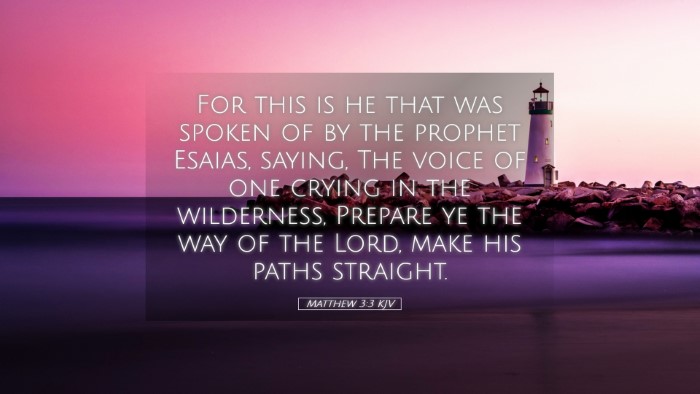Commentary on Matthew 3:3
The scripture of Matthew 3:3 reads:
"For this is he who was spoken of by the prophet Isaiah, saying: 'The voice of one crying in the wilderness: Prepare the way of the Lord; make His paths straight.'" (Matthew 3:3, NKJV)
This verse holds significant theological and prophetic implications, bridging the Old Testament prophecy with the New Testament reality. It serves as a foundational text for understanding John the Baptist's role as the forerunner of Christ.
Contextual Analysis
In the context of Matthew’s Gospel, this verse introduces John the Baptist, establishing his ministry as one foretold by prophecy. His call to repentance resonates with the message of preparation needed for the coming of the Messiah.
Prophetic Fulfillment
Matthew cites Isaiah 40:3, pointing to John as the fulfillment of this prophecy. The significance lies in the fulfillment of God's promises to His people, highlighting the continuity between the old and the new covenants.
John the Baptist's Role
John is identified as "the voice," emphasizing that his role is to proclaim rather than to be the object of focus. His enthusiastic call is fundamental in preparing the hearts of those who will encounter Jesus.
Theological Insights
Various scholars provide rich insights into the implications of this verse:
- Matthew Henry: Henry emphasizes the significance of John as a herald who calls for immediate action and transformation. He notes that the wilderness symbolizes both separation from the corruption of society and a return to a place of spiritual clarity.
- Albert Barnes: Barnes points out that the message of preparing the way for the Lord underlines the urgency of repentance and moral rectitude. He sees the 'paths' as metaphorical for the heart's readiness to accept Christ.
- Adam Clarke: Clarke focuses on the descriptive nature of the message. He elaborates on the wilderness context, suggesting a place of trial and testing, from which the people could witness God’s redemptive plan unfolding.
Practical Applications
The call for preparation in John’s message invites profound reflection and practical application for today’s believers:
- Personal Reflection: Each individual is called to assess their spiritual condition, asking whether they are preparing their hearts for the Lord. This self-examination is critical in fostering a receptive spirit.
- Community Engagement: Churches and faith communities are encouraged to engage in collective preparation through outreach, evangelism, and discipleship, echoing John’s call to repentance.
- Anticipation of Christ's Return: Just as John prepared the way for Christ's first coming, believers today are called to live in hope and anticipation of Christ’s return, aligning their lives according to His teachings.
Conclusion
Matthew 3:3 is not merely an introductory verse but a profound invitation to embrace the reality of Christ’s coming. It challenges the reader to respond appropriately—not just in a historical sense but in the context of personal faith and communal responsibility. The theological reflections provided by these public domain commentaries enhance our understanding of this critical passage and its implications for the life of the church today.


